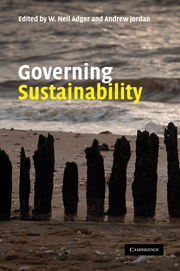Book contents
- Frontmatter
- Contents
- List of figures
- List of tables
- List of contributors
- List of abbreviations
- Foreword by Jonathon Porritt CBE
- Preface
- Part I Overview and Context
- Part II Governance and Government
- Part III Governance and Civil Society
- Part IV Governance and Decision Making
- 9 Participation, precaution and reflexive governance for sustainable development
- 10 Precaution and the governance of risk
- 11 Economics and the governance of sustainable development
- 12 Sustainability, welfare and value over time
- Part V Conclusions
- Index
- References
12 - Sustainability, welfare and value over time
Published online by Cambridge University Press: 05 June 2012
- Frontmatter
- Contents
- List of figures
- List of tables
- List of contributors
- List of abbreviations
- Foreword by Jonathon Porritt CBE
- Preface
- Part I Overview and Context
- Part II Governance and Government
- Part III Governance and Civil Society
- Part IV Governance and Decision Making
- 9 Participation, precaution and reflexive governance for sustainable development
- 10 Precaution and the governance of risk
- 11 Economics and the governance of sustainable development
- 12 Sustainability, welfare and value over time
- Part V Conclusions
- Index
- References
Summary
Addressing the paradox of sustainability
Sustainability and sustainable development have become key phrases in the unfolding politics of the environment. These terms are widely institutionalised in policy documents and governance systems. However, as Tim O'Riordan himself has remarked, at the same time the transition to a sustainable society looks, at best, difficult (O'Riordan, 1996). It is not my purpose in this chapter to offer a complete diagnosis as to why this is the case or to offer a solution. What I do want to do, is to look at one set of conflicting intuitions and experiences that in part underpin that difficulty and to explore the problems in some of the standard responses found in economic theory.
It is a now a commonplace assertion that the concept of sustainability appears to be used in a wide variety of different ways (see, for example, Chapter 1). The sheer variety of uses raises questions about what it is supposed to mean: the sustainability of what, for whom, and why? There are two different kinds of answer to these questions, often associated with different disciplines. One set of answers appeals to specific goods. What is to be sustained is a particular fishing stock, particular woodlands, particular agricultural systems, or habitats. For whom will often refer to some particular community – for example a fishing community, an agricultural community or indeed an association of non-human beings. The why will refer to particular goods, interests and values of those groups.
- Type
- Chapter
- Information
- Governing Sustainability , pp. 283 - 304Publisher: Cambridge University PressPrint publication year: 2009
References
- 4
- Cited by



